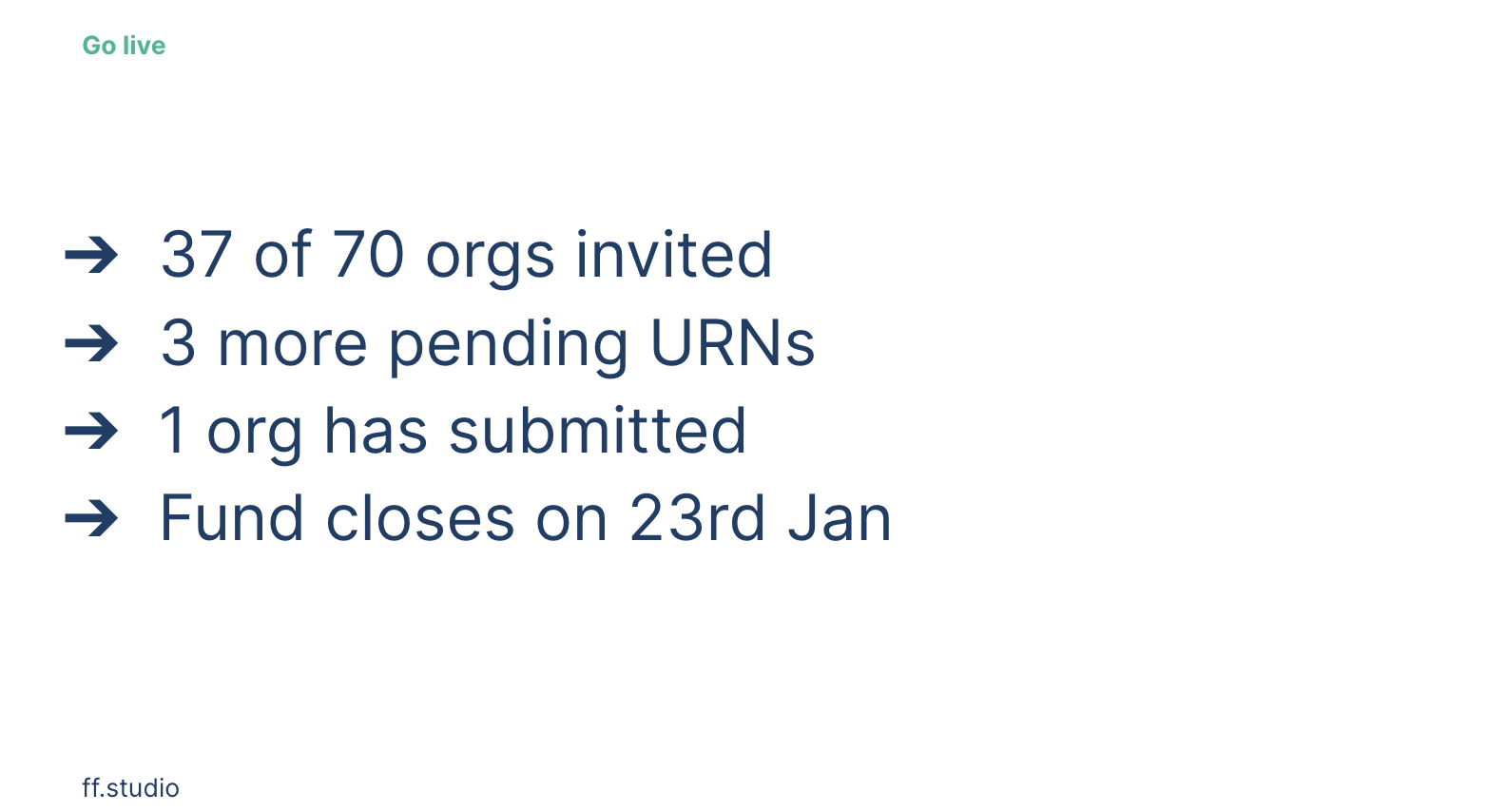Open Funding Pilot
8 - 12 January 2024
As a reminder, we are a team from Sport England and FF Studio working together on the Open Funding Pilot.
It will help Sport England try new ways of working and new funding models to enable them to get more people in underserved communities active. It will also show the wider Sport England organisation what delivery looks like if we shorten feedback cycles.
Weeknotes are a quick recap of the important things a team has done each week, what we’ve learned, and what’s the plan for next week. They also help us work in the open.
This is the end of week 14.
1. Running the fund

Image: screenshot from our recent show and tell: 37 of 70 organisations have been invited, 3 are being invited soon, 1 organisation has submitted an application.
2. The project extension
This pilot project has been extended until 9 February. This week:
- We’re planning some more research to get feedback and insight from both fund applicants and Sport England assessors. We want applicant feedback to be unbiased by the prospect of funding, which may mean ensuring that it is anonymous. We reviewed but won’t use Grant Advisor because we cannot adjust the standard questions in the time that we have. We are also considering offering a “Give us feedback any way you want” option.
- Cassie and Sian are talking to IMT about the assessment team and timescales.
- We are gathering ideas for prototypes on automation. Sian gave us a good starting point: the current mix of data and systems means that essential questions are sometimes really hard to answer, or progress slows down, or teams have to perform repetitive or unnecessary work. Currently we’re exploring 2 questions:
- What if we could take a mix of unstructured, semi-structured and structured data and present new views on it that let today’s difficult questions be answered easily?
- What if everything needed through the entire lifecycle of an application assessment sat in a single “document”, capable of containing an assessment, handling checklists and process flow from assessor to panel to director, showing the when/where/who of a decision, and being audited?
- We’re also drafting the final report for the pilot fund - more on this below.
Zooming out
Those that attended our show and tell will see that we are starting to reflect on the work. We went through what we considered to be the hits and misses of the project. They were:
- Make it real. Repeat. The team’s multidisciplinary skills and bias to building momentum meant we could prototype effectively, respond to change positively and improve at speed. Our pace of learning about stuff that we just didn’t know and what we need to have in place to open the fund increased significantly on meeting James and Claire for the first time.
- Teams work. Working with Sport England colleagues and teams made the difference. Without Cassie and Sian embedded in the team, we would have failed. And teams like IMT committed essential additional support at short notice.
- Momentum builds. Iterating the product more or less weekly was a really valuable forcing function for speed and learning. As were clear deadlines, tight scope and recognising when to shut out the noise.
- Questions matter. Including questions about inclusion, accessibility and climate are important strategically. Although we didn’t make the fund as unrestricted as we initially hoped, we kept the form simple as we could and only included questions that directly relate to making a decision about awarding funds (with the exception of the climate change question, the only one without a ranking).
- Working in the open. Weeknotes landed well in Sport England. Show and tells did too. They were not cheap, these notes take a while to author. But, we’re pleased we put the effort in to show how beneficial it can be. It feels worth it. Example: Tim - “this is really good”.
- Too isolated? If you want to Go fast, go alone. If you want to go far, go together. It took us a while to find the balance between those things. We took too long to collaborate with IMT. We did not initially understand which decisions and information would need to go to ELT, which felt disempowering. However - sometimes, going it alone, making a first version of a thing without the baggage of previous ideas is helpful. We often say “new ideas need protecting in a way that the status quo does not”.
- Over-managing risk? There were times during the project that responses to risk and the approaches to the product service delivery didn’t feel proportionate. We were running a small pilot, finding our way forward and trying new things. This bumps up against business as usual, bigger releases and just risk minimisation in general.
- (Not) everyone owns it. No-one owns fund strategy at Sport England, which means every team consulted effectively has veto power. This can slow decision-making, reduce progress and create discord. In week 2 we wrote in our weeknote that a decision had to be made to stick to £250k as an award limit in order to stay within tier 1 as much as possible, but it wasn’t until the 4th of December which is week 11/12 that it stuck thanks to an ELT session and agreement. This is very natural for an organisation of ~300 at this state of development around services, and points at some opportunities for future work.
These reflections will feed into our report, but also into work the Transformation team are doing around transformation planning, business planning and processes.